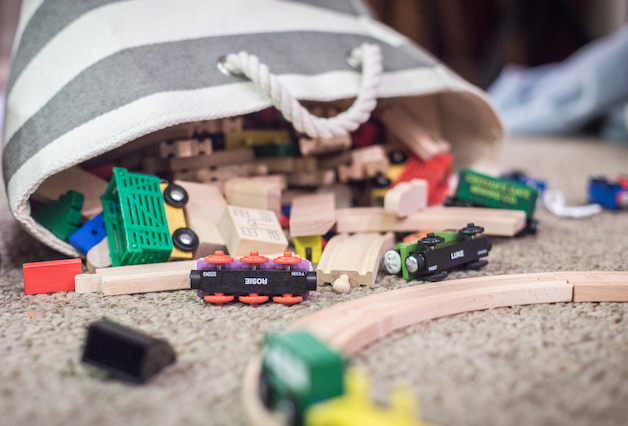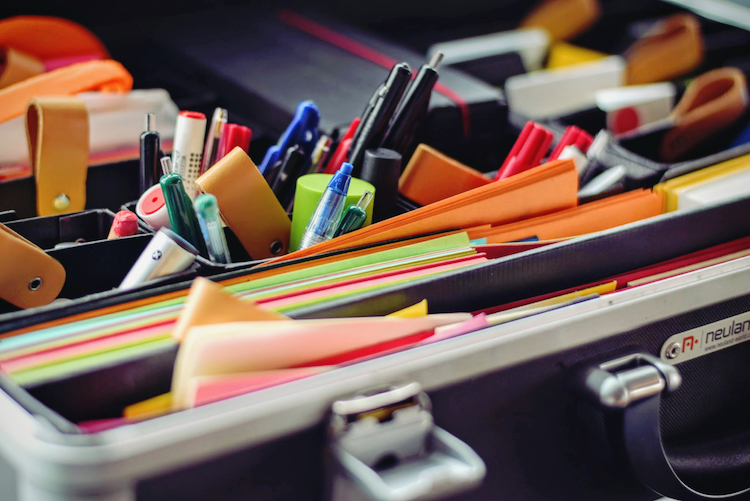How to Fight the Stress
of “The Mess”

Does this sound familiar? You walk into your home and instead of being greeted by a peaceful, easy feeling…your heart rate quickens, you’re left gasping for breath, and your eyes start darting back and forth. You’ve been overcome by the stress of the mess!
Psychologists say physical reactions like these are common when we encounter an uncomfortable situation or environment. So how can our place of peace, our sanctuary, our home-sweet-home cause us stress? The answer is simple – clutter!
Clutter causes mess and mess causes stress!
Before we explore the great ways to limit stress caused by a mess, let’s take a look at exactly why the pile of old magazines stacked up in the corner of your home office can lead to anxiety. A recent article in the prestigious magazine, Psychology Today, explains that clutter:
- Bombards our minds with excessive stimuli and distracts us by drawing our attention away from what we should actually be focusing on;
- Makes it more difficult to relax, both physically and mentally; by constantly signaling to our brains that our work is never done;
- Makes us anxious because we’re never sure what it’s going to take to get through to the bottom of the pile;
- Creates feelings of guilt (“I should be more organized”) and embarrassment, especially when others unexpectedly drop by our homes or work spaces;
- And proves frustrating by preventing us from locating what we need quickly (e.g. files and paperwork lost in the “pile” or keys swallowed up by the abyss).
Feelings of stress are physiological reactions meant to send up warning signs designed to trigger a response. Humans generally respond to stress in two ways: we fight or we flee. Fighting is our way of confronting whatever it is that feels uncomfortable or threatening. We “fight” by recognizing a problem exists and then taking action. Fleeing is our way of avoiding uncomfortable situations or getting out of harm’s way. We “flee” in all sorts of ways, from simply ignoring the stimuli to literally running from it! Both physiological responses are valuable, appropriate, and common.
It’s easy to flee from messy clutter, because it’s not dangerous and not an immediate problem. We have built-in defense devices that help us to flee from the stress of cluttered closets, overstuffed boxes stored under the beds, or garages filled with kids toys and unused garden supplies. Slowly but surely the clutter outgrows the space, and over time, our mess overwhelms it and starts to cause stress instead of enjoyment. We have all been there. It is time to stop fleeing and start fighting the mess that causes you stress. Ask yourself, “Do I feel stressed when I walk through my front door, open my closets, or go into my garage?” If the answer is “Yes”, then it is time!
Imagine for a moment walking into your home and feeling calm, relaxed, and at peace. To achieve that wonderful feeling, let’s first dust off our superhero capes and start fighting back against the stress caused by our mess. Let’s change those “flee” instincts into productive “fighting” techniques. From Psychology Today, here are some great how-to tips:
1. Tackle de-cluttering as a family. If clutter has invaded your entire house, don’t take on the job alone. Get the whole family involved by starting with a room everyone uses and making each person responsible for a section. If you’re on your own, start with one area at a time and finish de-cluttering that area before moving on to another. This will give you a sense of accomplishment as you see your successes mount little by little.
2. Create designated spaces for frequently used items and supplies, so that you can quickly find what you’re looking for when you need it; however, try to make these designated spaces “closed” spaces, such as drawers and cabinets. Storing things on open shelves or on top of your desk does not remove the visual stimuli that create stress.
3. If you don’t use it, don’t want it, or don’t need it, get rid of it. You can toss it, recycle it, or, better yet, donate it to the Vietnam Veterans of America (VVA) and help support America’s veterans (you’ll find more info about that at the end of this blog).
4. If you use an item, but only rarely, store it in a box in the garage or in a spot that is out of sight, and mark the box with the date of storage. With rare exceptions, if you haven’t opened the box in a year, whatever is inside is probably not something you need, so instead you’ll want to donate it, too.
5. When you take something out of its designated space to use it, put it back immediately after you’re finished with it. Sounds simple, but it actually takes practice and commitment. As the saying goes, “A place for everything, and everything in its place.”
6. Don’t let papers pile up. Random papers strewn everywhere can be Public Enemy No. 1 when it comes to stressful clutter. We’re inundated with mail, flyers, menus, memos, newspapers, and the like. The key is to be conscious of what you and others bring into your spaces. Go through these papers as soon as you can, tossing what you don’t need and storing what is necessary in its proper place.
7. Create a pending folder. A pending folder helps you clear off your work space while at the same time provides you with a readily accessible folder to centralize and easily locate pending projects.
8. De-clutter your primary work space before you leave it. It’s normal to pull things out while you’re working in a space, but make a habit of cleaning off your work space before you go. Not only will this give you a sense of closure when you leave, it will also make you feel good when you return to a nice, clean space.
9. Make it fun! As you’re going about and cleaning things out, put on some of your favorite tunes. The more up-beat, the better! Not only will you enjoy the tunes, the time will pass faster and you’ll probably work faster than you would without the music.
Tackling messy clutter will reduce your stress and make your home sweet again. Not to mention, feeling calm, happy, and fulfilled is a wonderful reward for your work! Standing up to your messy clutter has paid off — coming home is now peaceful, your mind and body knows your work is complete, and you can relax with confidence and a sense of success.
Now, what to do with all that stuff that you do not need anymore? Donating the items you have cleared out can turn someone else’s residence into a “home-sweet-home.” Donating your treasures brings you and others a sense of gratitude. Schedule a free donation pickup with Pickup Please and support the Vietnam Veterans of America (VVA). The VVA provides services for veterans and veteran families in need. Our veterans are our nation’s superheroes and have given so much to us all. It’s time to be a superhero for them!
America’s Best Donation Pickup Program





